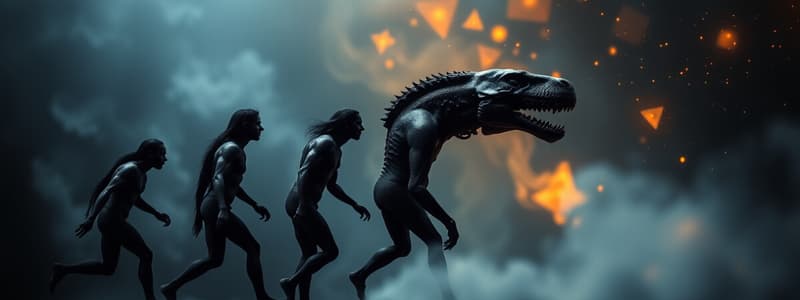Podcast
Questions and Answers
Which of the following properties or processes do we associate with living things?
Which of the following properties or processes do we associate with living things?
- Evolutionary adaptations
- Energy processing
- Responding to the environment
- Growth and reproduction
- All of the above (correct)
Which of the following is not a theme that unifies biology?
Which of the following is not a theme that unifies biology?
- Structure and function
- Evolution
- Interaction with the environment
- Reductionism (correct)
- Emergent properties
Which of the following sequences represents the hierarchy of biological organization from the least to the most complex level?
Which of the following sequences represents the hierarchy of biological organization from the least to the most complex level?
- Organelle, tissue, biosphere, ecosystem, population, organism
- Molecule, cell, organ system, population, ecosystem, biosphere (correct)
- Organism, community, biosphere, molecule, tissue, organ
- Ecosystem, cell, population, tissue, organism, organ system
- Cell, community, population, organ system, molecule, organelle
A localized group of organisms that belong to the same species is called a
A localized group of organisms that belong to the same species is called a
Which of the following is a false statement regarding DNA?
Which of the following is a false statement regarding DNA?
In terms of the hierarchical organization of life, a bacterium is at the ______ level of organization, whereas a human is at the ______ level of organization.
In terms of the hierarchical organization of life, a bacterium is at the ______ level of organization, whereas a human is at the ______ level of organization.
Which of these is a correct representation of the hierarchy of biological organization from least to most complex?
Which of these is a correct representation of the hierarchy of biological organization from least to most complex?
Organisms interact with their environments, exchanging matter and energy. For example, plant chloroplasts convert the energy of sunlight into
Organisms interact with their environments, exchanging matter and energy. For example, plant chloroplasts convert the energy of sunlight into
The main source of energy for producers in an ecosystem is
The main source of energy for producers in an ecosystem is
The dynamics of any ecosystem include the following major processes:
The dynamics of any ecosystem include the following major processes:
For most ecosystems, [blank] is (are) the ultimate source of energy, and energy leaves the ecosystem in the form of.
For most ecosystems, [blank] is (are) the ultimate source of energy, and energy leaves the ecosystem in the form of.
The illustration above represents
The illustration above represents
Flashcards are hidden until you start studying
Study Notes
Key Themes in Biology
- Seven major themes highlight the study of biology, with a core focus on evolution.
- Inductive reasoning is used to formulate general conclusions from observations.
- Deductive reasoning tests hypotheses based on established premises.
Properties and Processes of Living Things
- Living organisms exhibit evolutionary adaptations, energy processing, responsiveness to the environment, and growth and reproduction.
- All of the mentioned properties are essential characteristics of life.
Hierarchy of Biological Organization
- Biological organization ranges from simple to complex: molecule, cell, tissue, organ, organ system, organism, population, community, ecosystem, biosphere.
- A localized group of organisms of the same species is termed a population.
DNA and Cellular Structure
- Each chromosome consists of a long DNA molecule with numerous genes.
- Cells are enclosed by membranes, utilizing DNA as genetic information.
- All life forms comprise cells; not all cells have a membrane-enclosed nucleus.
Energy Flow in Ecosystems
- Primary energy source for producers is sunlight, converted into chemical energy by plants' chloroplasts.
- Energy flows in ecosystems from sunlight to producers, then to consumers, with nutrients being recycled.
Interaction Between Organisms and Environment
- Organisms exchange matter and energy with their surroundings, essential for ecosystem dynamics.
- The ultimate source of energy in ecosystems is sunlight, which dissipates as heat, impacting energy availability.
Misconceptions in Biology
- Understanding correct biological organization level is crucial; for example, bacteria are single-celled organisms, while humans are multicellular.
- Identifying false statements about DNA and cellular structures helps eliminate misconceptions in biological studies.
Summary of Ecosystem Dynamics
- Major processes in ecosystems include energy flow from producers to consumers and the recycling of chemical nutrients, emphasizing interdependence in biological systems.
Studying That Suits You
Use AI to generate personalized quizzes and flashcards to suit your learning preferences.




